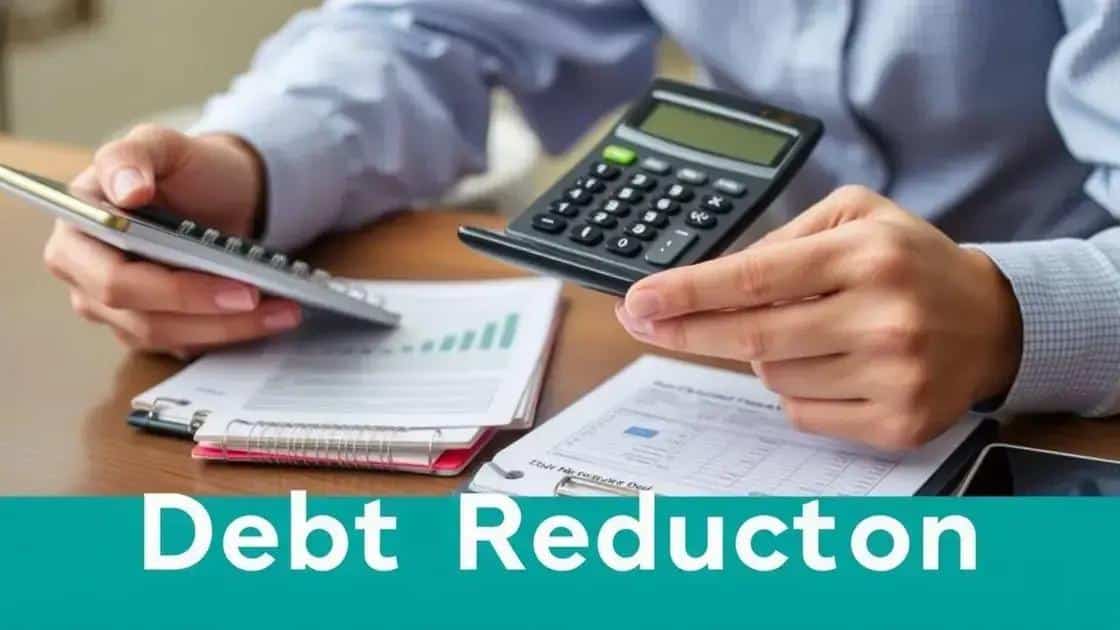Value debt reduction methods that really work

Value debt reduction methods are effective strategies such as budgeting, negotiating with creditors, and using debt repayment techniques like the snowball method, aimed at helping individuals manage and reduce their debt effectively.
Value debt reduction methods can seem overwhelming, but they hold the key to reclaiming your financial stability. Have you ever wondered which strategies truly make a difference? In this article, we’ll explore practical approaches that help you manage and reduce your debt effectively.
Understanding value debt reduction
Understanding value debt reduction methods is crucial for anyone looking to regain control of their finances. By focusing on the methods that offer real value, you can create a plan that helps reduce debt effectively and sustainably.
What is value debt reduction?
Value debt reduction refers to strategies that aim to lower debt amounts in a way that is beneficial to your financial health. These methods often focus on high-interest debts first, reducing the total amount of money paid over time. Understanding your debt is the first step towards effective management.
Key strategies to consider
Here are some effective strategies that can aid in value debt reduction:
- Debt snowball method: Pay off smaller debts first for quick wins.
- Debt avalanche method: Focus on paying off high-interest debts to save money.
- Negotiating with creditors: Speak with creditors for lower interest rates.
- Consolidation: Combine debts into one loan with a lower rate.
It’s also important to create a budget that tracks your income and expenses. By knowing where your money goes, you can make informed decisions on how to allocate funds towards your debt. A well-planned budget ensures that you can manage living expenses while still focusing on debt reduction.
The role of financial education
Educating yourself about personal finance can significantly impact your ability to reduce debt. Many resources are available online that explain debt management techniques, budgeting tips, and financial planning strategies. Investing time in these resources can provide you with the knowledge needed to make sound financial decisions. Financial literacy enables you to understand the implications of debt and the benefits of different reduction methods.
As you explore these value debt reduction methods, remember that consistency and commitment are key. It’s essential to stay focused on your goals and adjust your strategies as needed. Every step you take towards reducing your debt brings you closer to financial freedom, improving not just your balance sheet but your overall well-being as well.
Strategies for effective debt negotiation
Strategies for effective debt negotiation can greatly improve your chances of reducing what you owe and making your financial situation more manageable. Negotiating with creditors may seem intimidating, but it can lead to significant savings.
Preparing for negotiation
Before reaching out to your creditors, it’s crucial to prepare. Gather all necessary documentation regarding your debts, such as account numbers, outstanding balances, and payment history. Knowing the details about your financial situation will empower you during the negotiation.
Key strategies to use
Here are some strategies that can help you negotiate more effectively:
- Be honest about your situation: Explain your circumstances clearly, showing why you need assistance.
- Request a specific reduction: Propose a clear amount you can afford and explain how it will help.
- Stay calm and polite: Professionalism fosters cooperation and may lead to better outcomes.
- Consider a lump-sum payment: Offering a one-time payment can entice creditors to forgive a larger portion of your debt.
After you’ve proposed your terms, be patient. Creditors may need time to consider your request or counter with their own offer. It’s essential to stay focused on your objectives while remaining flexible enough to consider alternatives. During the negotiation process, remember that persistence can pay off.
Follow-up and finalize the agreement
Once you reach an agreement, make sure to get the terms in writing. This documentation is crucial for preventing any misunderstandings in the future. Pay careful attention to the repayment schedule and additional fees, if any. Keeping track of these details will help you uphold your end of the agreement and maintain a positive relationship with your creditor.
By utilizing effective debt negotiation strategies, you can pave the way towards a less stressful financial future. Remember that every little bit counts, and your efforts can lead to reduced payments and a clearer path to financial freedom.
How to create a budget for debt reduction

Creating a budget for debt reduction is a vital step toward regaining control over your finances. A well-planned budget helps you allocate your income in a way that prioritizes paying off debt while still managing living expenses.
Assess your income and expenses
The first step in building your budget is to assess your total income. This includes your salary, any side jobs, and other income sources. Once you know how much money is coming in, make a list of all your monthly expenses. This includes rent, utilities, groceries, transportation, and entertainment.
Identify your debts
Next, identify all your debts. List each one with its respective balance, interest rate, and minimum monthly payment. Understanding the full scope of your debt situation is crucial for effective budgeting. By knowing how much you owe, you can make informed decisions about how to allocate your funds.
Set realistic financial goals
When creating your budget, set realistic financial goals. Determine how much you can afford to put towards your debt each month after covering your essential expenses. Consider using money management apps to help you track your spending and savings. Setting achievable goals keeps you motivated and focused on your path to becoming debt-free.
As you create your budget, remember to include a category for savings, even if it’s a small amount. This can help cushion unexpected expenses and prevent further debt. Always look for ways to cut back on non-essential expenses. For example, dining out less or cancelling unused subscriptions can free up extra cash for debt payments.
Monitor and adjust your budget
After implementing your budget, it’s important to monitor it regularly. Check in at the end of each month to see how well you’re sticking to your plan. If you find certain areas challenging, adjust your budget as necessary. Staying flexible allows you to respond to changes in income or unexpected expenses while still focusing on debt reduction.
Creating and maintaining a budget can be daunting, but breaking it down into manageable steps makes it easier. As you become more comfortable with budgeting, you’ll find it easier to make financial decisions that positively impact your debt situation.
The role of credit counseling services
The role of credit counseling services is critical for individuals struggling with managing their debts. These services provide expert guidance to help you understand your financial situation and find effective strategies for reducing debt.
What credit counseling services offer
Credit counseling services typically offer a range of support options. They can help you create a budget tailored to your financial needs and goals. Additionally, they provide education on credit management and can clarify the implications of various financial decisions.
Assessing your financial situation
During your initial meeting with a credit counselor, they will assess your overall financial situation. This includes reviewing your income, expenses, and debts. Understanding all aspects of your finances is essential for the counselor to help you devise the best plan for debt reduction. They might suggest various strategies based on your specific circumstances, such as debt management plans.
Creating a debt management plan
If appropriate, a credit counselor may recommend a debt management plan (DMP). A DMP consolidates your debt payments into one monthly amount paid to the counseling agency, which in turn pays your creditors. This can simplify your payments and may result in reduced interest rates or fees, making it easier to pay off your debts. Following a DMP can also help improve your credit score over time.
Furthermore, credit counseling helps empower consumers to make informed financial decisions. It provides tools and resources to navigate the complexities of debt management. Many agencies offer workshops or online courses on budgeting, saving, and credit education, fostering a deeper understanding of personal finance.
Finding a reputable service
When seeking credit counseling, it’s important to find a reputable organization. Look for agencies that are certified and accredited. Check reviews and ask if they offer free consultations. A trustworthy counselor will prioritize your needs and work at your pace, creating a plan that aligns with your financial goals.
Overall, the role of credit counseling services is to support individuals in their journey to financial management. These services can guide you through challenges and help you find sustainable solutions for achieving financial stability.
Real-life success stories in debt reduction
Real-life success stories in debt reduction inspire many to take charge of their financial futures. Hearing how others have overcome their challenges can motivate you to embark on your journey toward financial freedom.
Case Study: Sarah’s Journey
One example is Sarah, who faced over $30,000 in credit card debt. After realizing her financial situation was unsustainable, she sought help from a credit counseling service. With their guidance, she created a budget and learned to prioritize her spending.
Effective strategies implemented
Sarah focused on the following strategies:
- Debt snowball method: She tackled her smallest debts first, which provided quick wins and motivated her to continue.
- Cutting unnecessary expenses: Sarah reduced dining out and opted for more affordable entertainment.
- Increased income: To accelerate her progress, she picked up a part-time job to funnel more money into her debt payments.
In just three years, Sarah managed to pay off her debt completely, demonstrating how dedication and a solid plan can lead to success.
Case Study: Mark’s Transformation
Another inspiring story is Mark’s, a man who struggled with student loans and personal loans totaling $50,000. He felt overwhelmed but decided to take control after attending a financial literacy workshop.
Key takeaways from Mark’s experience
Mark learned to implement several key strategies:
- Creating a detailed budget: By identifying where every dollar was going, he pinpointed areas for improvement.
- Using automatic payments: This helped him stay consistent with payments and avoid late fees.
- Negotiating with creditors: Mark contacted his loan providers to lower interest rates, which further aided his debt reduction.
In four years, Mark paid off all his loans and built a solid savings account. His story highlights the importance of education and proactive measures in achieving financial health.
These real-life success stories in debt reduction show that with the right mindset and strategies, anyone can turn their financial situation around. They remind us that we are not alone in our struggles, and with persistence and the right tools, financial independence is within reach.
In conclusion, achieving debt reduction is possible with the right strategies and support. Real-life success stories like Sarah and Mark show that anyone can reclaim their financial futures through commitment and effective planning. By utilizing methods such as budgeting, negotiating, and seeking help from credit counseling services, individuals can take control of their finances. Remember, every step you take towards reducing your debt is a step towards a brighter financial future.
FAQ – Frequently Asked Questions about Debt Reduction
What are effective methods for debt reduction?
Effective methods include creating a budget, negotiating with creditors, and using strategies like the debt snowball or avalanche method.
How can credit counseling services help me?
Credit counseling services provide guidance on managing your finances, help create a budget, and offer debt management plans.
Can I reduce my debt without a credit counselor?
Yes, you can reduce debt on your own by educating yourself, creating a budget, and being disciplined about payments and spending.
Are real-life success stories helpful for motivation?
Absolutely! Hearing about others’ successes can inspire you to take action and believe that you can achieve your own debt reduction goals.






